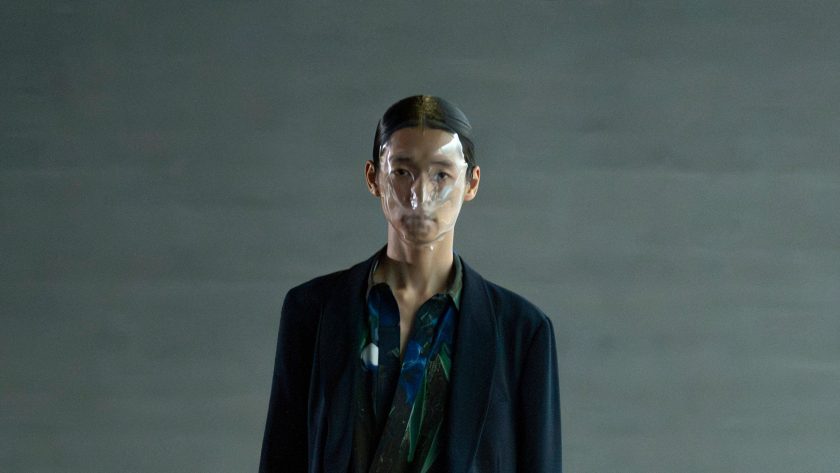Ever the art lover, Kohichi Watanabe based his spring 24 collection on the famous painting Irises by the Japanese artist Korin Ogata, a key figure in the Rinpa school of art started in 17th century Kyoto. Though Watanabe’s references often pick up on Japan’s rich cultural history, his touch is a contemporary one, twisting the elegance of traditional details into modern wearable (i.e. Western) clothing.
This time he brought in help. Together with Nishimura Shoten—a Kyoto manufacturer of foil and gold leaf currently in its third generation of artisans—Watanabe created a unique Irises-inspired print, painting leaves and flowers over traditional baked foil to create a gradient of iridescence. “We tried to emulate the Rinpa expression in the present tense,” Watanabe shared over email. The printed dresses, shirts, and scarves, which appeared between more subdued staples like tailored blazers, billowing trousers, and samue-style shirts (with ties at the hip), were well-executed, lending the collection a soft romance.
Watanabe had clearly been seeking connection this season. Including the partnership with Nishimura, the collection featured no fewer than four collaborations. The spiky shibori bags that models carried were created in partnership with Bunzaburo Shoten, a Kyoto brand founded in 1915. He also teamed up with Maison Eureka, a Berlin-based label headed up by Japanese designer Yurika Nakatsu on graphic T-shirts that feature folk art prints.
Most convincing was a charitable union with Yamazaki Rokkougei, a Kyoto-based factory that makes ornaments such as vases, tea utensils and incense burners for Buddhist temples. “Yamazaki Rokkougei showcases incredible skills, but due to the pandemic, the number of jobs, especially at temples and shrines, has been drastically decreasing,” said Watanabe. “We decided to collaborate because we wanted to present their work to the world in the context of fashion.”
The resulting metal cuffs, earrings, and necklaces were made by using an ancient wax casting method and they complemented the collection well. It was a clever way to breathe life into a dying art, and reappropriate it into a fashion collection. Appreciators of true Japanese artisanship can sleep easier knowing Watanabe is around to nurture it.



